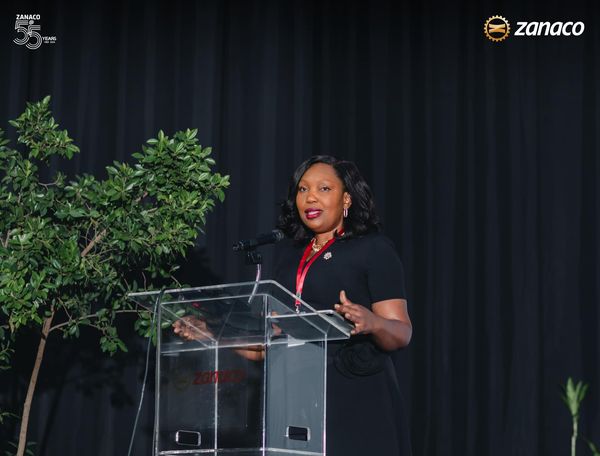
By Jeff Kapembwa
The climate financing symposium-the first to be held in Zambia to raise resources for enveloping the climate change buffeting the Southern African state-losing an estimated 1 million hectares of planted maize in the 2023-24 season calls for resilient and pro-mitigation actions to militate future losses.
Zambia National Commercial Bank (Zanaco), has heeded the Government’s cry for actionable solutions against climate change in the country and mopped US$50 million for mitigation strategies as espoused under the country’s National Adaptation Plan, a blueprint mooted to save the economy and the environment from human induced degradation.
The Lusaka listed financial institution and one of the oldest members of the Lusaka bourse, recognizes its obligation as one of the oldest indigenous financial institutions in driving a positive change through greener projects and initiatives as Zambia, like other countries fighting climate change through mitigation and enhancing resilience.
Established in 1966 as Zambia’s indigenous bank and providing a wide range of financial services to retail customers, large corporations, and agribusiness and public sector clients the institution has dangled US$50 million for access by the private sector to undertake various climate actions through mitigations and improve the country’s resilience against the crisis.
Zanaco Chief Executive Officer Mukwandi Chibesakunda underscores the financial institution’s resolve to join the fight and has undertaken a wide range of initiatives and sustainable finance products to support green projects and initiatives-all contributing to environmental protection and climate resilience.
According to scientific interpretation, green climate financing entails replacing artificial ingredients with natural ingredients that are non-toxic, energy and water efficient, harmless to the environment, recyclable and biodegradable and don’t harm the environment.
Under the affiliation of the Green Climate Financing (GCF) Zanaco’s US$50 million secured from the British International Investment, the UK’s development finance institution and impact investor for climate related projects is intended to finance products promoting green projects and initiatives that enhance environmental protection and climate resilience.
Closing the climate financing symposium in Lusaka which attracted various project developers, sponsors, investors, regulators, government agencies, and other experts in climate action.
This is arguably to accelerate financing of the country’s mitigation and adaptation effort, Ms. Mukwandi stressed the bank’s role and commitment in reversing the climatic effects through green projects and fighting climate change and needing partners.
The unity of purpose between the bank and the private sector players to tap into the financing will enhance sustainability through innovative green projects and collectively make a meaningful impact on climate change and create a more resilient and sustainable future for now and the generations to come.
“By leveraging our GCF accreditation, businesses can tap into financial resources specifically earmarked for climate-related projects, enabling them to implement sustainable solutions that benefit both the environment and society,” she told delegates.
Zanaco underscores the country’s need to promote carbon credits as a ‘game changer in unlocking climate financing in Zambia but its success calls for close collaboration among the private sector, farmers and other stakeholders are encouraged to utilize chances carbon credits are offering.
World Bank’s assessments show carbon pricing revenue in 2021 surging by over 60 percent to US$84 billion from a year earlier, providing an important source of funds to assist as a sustainable source of economic recovery.
This effort helps in financing broader fiscal reforms, or investment in communities as part of the low-carbon transition future. Global revenues from the sale of carbon permits in Emissions Trading Systems (ETS) grew to a record US$74 billion last year.
This is undertaken as governments increasingly turn to such schemes to help tackle global warming. The US$74 billion raised from permit auctions in 2023 was up from US$64 billion in 2022 and more funding will be needed to sustain resilience chiefly in Africa.
The symposium was officiated by minister of green economy and environment Collins Nzovu, Africa’s chief campaigner against climate change and looks forward to financing by world’s major emitters of GreenHouse Gases, US, India, China, Japan, among others.
The GreenHouse Gas emissions have reversed economic and environmental gains made by Least and Developing Countries, all at the mercy of the crisis.
This is evidenced by the climate crisis affecting Zambia which has lost in excess of US$900 million worth of humanitarian aid after drought swept through the Southern African state affecting 7 million people, now facing starvation.
The climate crisis calls for unwavering funding towards climate resilience through adaptation practices as a commitment among all players.
